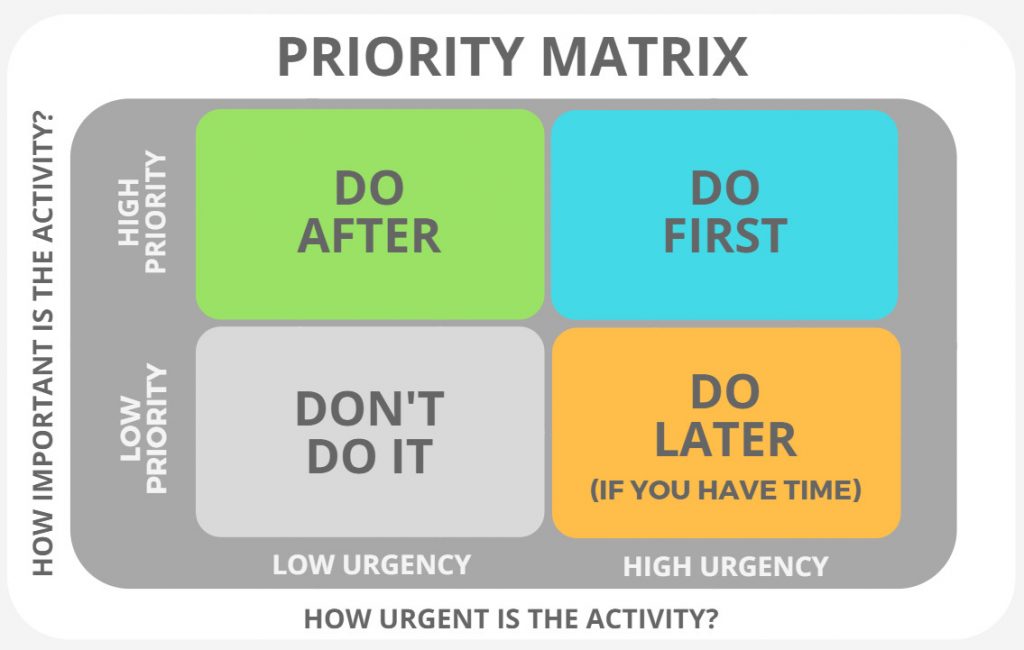Time management is not a difficult concept to understand, but very difficult to put into practice effectively! If you cannot do it well, you’ll certainly have a lower performance at work and less time to enjoy your life outside the office.
With this in mind, here are 11 simple tips that you can implement in your daily routine that will bring you a better quality of life. Some of them have to do with good task planning and others, with everything that in your daily work routine prevents you from executing what you had planned. “Life as it is”, if you will!
This is the first step towards good time management. Basically, you make a list with the tasks you have to do and, at the same time, rank them according to priority and urgency. A very important tip is to integrate this list into your schedule. Select the important actions and reserve the number of hours you need to take care of them.
For each activity, define whether it is of high or low importance and whether it is urgent or not. Important and urgent activities must be performed first, followed by important but not urgent activities. Last of all, and when there is time left, do the least important but urgent ones. Ignore unimportant and non-urgent activities.

Priority Matrix
If your day-to-day life is the same as mine, I am sure that a multitude of interruptions and emergencies appear unexpectedly and prevent you from accomplishing what is most important for your success. It is for this reason that you should set a specific time in your schedule for each important activity.
By doing this, you will have a higher chance of accomplishing them, as you will have set aside a specific period for each one, time of day, location, people and mechanisms to reduce or eliminate interruptions and distractions. If you do not do that, there is a great chance the day will go by and you will have not been able to accomplish what matters most to you.

Dad with baby on his lap (Photo: Pixdeluxe / iStock)
You must have a favorite period of the day when you are more awake, active, motivated, and efficient, right? Let’s call it your prime time. Mine is early in the morning, in the early hours of the day and my wife’s is at night. What’s yours? The objective here is simple: allocate the most important or difficult activities of your day precisely to this particular period and simply see how it improves effectiveness.
Let me give you a personal example to show you how this works. If you have or have had a baby who is a few months old, you know that the parents’ sleep is frequently interrupted during this phase of their life. Over time, you and your spouse or husband suffer from a lack of sleep and both your professional performances drop in the same proportion.
Here at home, we dealt with this in a simple way: if the baby woke up between midnight and 4am my wife would pick him up; if it was between 4 and 8 a.m., it was my turn. This simple shift system was what helped us the most to overcome this phase and maintain good professional performance during the first few months of our three children’s lives.
One of the key productivity and time management secrets is to be very careful about the time you spend with the pre-tasks associated with them.
Pre-tasks are each and every activity that you end up performing before the task itself. It does not matter if it is preparation, pre-study or simply doing things that delay the accomplishment of what really matters: the task itself.
I know that, like me, you’re human and you’ve been through this before, right? Exactly. If you find yourself wasting too much time on this, my suggestion is simple: stop what you are doing and start doing the task itself. After you finish, see if there’s still any pre-task to be done that had seemed so relevant before. I doubt it!
You do not have to perform all your tasks yourself. Do you have more people working with you? Do you have more people on your team? Good people who can perform part of the tasks and are often even more capable than you of doing this? People that are eager to help you?
Well, delegate to them parts of your assignments and dedicate yourself to those that really depend on you, in other words, those that can’t be done for you by anyone else and you will be on the right track to improving your time management.
What I’m saying is, devote yourself to that 20% of the most important tasks that will generate 80% of your success. The others, you can delegate without fear.
Interruptions are a part of your day-to-day life, especially if you work in an open office with lots of people around you, and although you cannot eliminate them, you can definitely choose the amount of time you will spend on dealing with them and how much time you will spend on activities that will drive you to success.
The key here to improving your time management is to pre-schedule time for interruptions among the most relevant tasks. Just clogging your schedule with time for important activities is naïve. Identify how much of your day you spend on interruptions and allocate the appropriate amount of time, as if it were a strip of fat on the agenda, and try to understand what you can actually do to reduce it.
Are you one of those people that leave all phone alerts on? Who check Facebook, Twitter, Instagram accounts, etc., whenever something new is posted? Do you leave your e-mail account logged on and check from time to time if there is something new in the inbox and promptly answer it? If the answer is yes to any of these questions, you are a person who lets yourself be distracted and needs to focus your time better.
If staying online like this is not a prerequisite to performing well (it is for some people), my suggestion is to turn off all alerts and predetermine times in the day to check your email. I, for example, never look at my e-mails in the morning, because this is my prime time.
You can be sure that if it’s really urgent, people will find you. Remember that saying that bad news travels fast? There you go…

Woman having coffee (Photo: Dc Lovensky / Unsplash)
This tip may seem paradoxical, but it’s not. If you want to maintain your physical, emotional and mental health at the maximum level, you need to take a break from time to time. Get up to get some water, go to the bathroom, have some fruit. Enough to distract yourself a little.
I learned this from a boss who was a smoker. From time to time she would stop and leave the building to smoke. After 10 minutes at most, she was back in battle. Extra tip: although I do not smoke, sometimes I accompanied her and discovered that if I wanted to ask her for something, just after she finished smoking was the best moment of the day, because it was the moment when she was most relaxed…
There will always be people asking you to do things and maybe you are one of those people who cannot say “no”. If this is your case, you can be sure that you will have much more difficulty in performing your time management well. As a dear colleague used to tell me, “Urgent to you is something important for someone else that he or she didn’t plan properly to do it on time”.
In another article, I will talk some more about “how to say no” which is neither simple nor obvious, but for now, you should know that the secret here lies in two things: do not make yourself immediately available all the time, and that your ability to say no, even to your boss, is commensurate with your ability to deliver great results. The better you are at delivery, the more people will understand when you say you will not perform a certain task.

Post-it on the computer (Photo: Shaun Wilkinson / iStock)
This tip is magic with regard to your nightly quality of life. Every day, when I get to the end of my working day and I turn off my laptop, I go over my schedule for the next day and allocate the tasks there. I put it all on a post-it, put it up on the screen, turn off the computer, and close the screen. The next day, when the process is reversed, the first thing I see is my schedule for the day with the activities I need to do.
Did you remember anything during the night or interact with someone and something new came up that needs to be done tomorrow? Send yourself an email with this in the title and that’s it. This daily practice helps a lot to have a more relaxed night and a better sleep, after all, you will be relaxed and will not forget something important for the next day.
Cover photo credit – Woman checking schedule (Photo: Daria Nepriakhina / Unsplash)